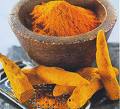Turmeric Can Help In Reducing The Size Of Haemorrhagic Stroke
A recent research has shown that turmeric may help in reducing the size of a  haemorrhagic stroke. Turmeric, a bright yellow aromatic spice with bitter taste is found in every Indian home. It is used in everything from cooking to holy rituals to cures of various aliments. It is commonly used for treatment of inflammatory and digestive disorders in Ayurvedic as well Chinese medicine. Turmeric, which is also called curcumin is the root of a tropical plant related to ginger. This research was led by Jay McCracken, along with Krishnan Dhandapani, neuroscientist in the MCG School of Medicine.
haemorrhagic stroke. Turmeric, a bright yellow aromatic spice with bitter taste is found in every Indian home. It is used in everything from cooking to holy rituals to cures of various aliments. It is commonly used for treatment of inflammatory and digestive disorders in Ayurvedic as well Chinese medicine. Turmeric, which is also called curcumin is the root of a tropical plant related to ginger. This research was led by Jay McCracken, along with Krishnan Dhandapani, neuroscientist in the MCG School of Medicine.
In the recent research, researchers used animal model to test the effects of turmeric on intracerebral haemorrhages (ICH). During ICH there is rupturing of a blood vessel in the brain and the subsequent bleeding into the tissues of the brain. It is a common and serious disease. Nearly 1 to 2 out of 10 patients with stroke have an ICH. Patients suffering from ICH are often misdiagnosed and treated for symptoms such as headache and nausea with medications, but not the stroke itself.
Scientists at the US-based Medical College of Georgia used the animal models to see the effects of turmeric on intracerebral haemorrhages (ICH). In this research, researchers dissolved the turmeric powder in corn oil and injected it into the abdomendefine of an animal model of haemorrhagic stroke three times over three hours.
McCracken said: "We found that curcumin significantly decreases the size of a blood clot, but we're not sure why it happens." Researchers believe turmeric’s anti-oxidant and anti-inflammatory properties help in reducing size of blood clot. Earlier studies have shown that turmeric could be an effective enhancer of an enzyme that protects the brain against oxidative conditions.